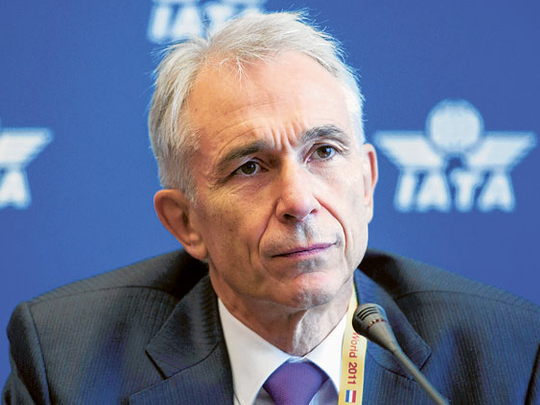
Dubai: A top global aviation industry official lambasted governments for using airlines as a tool to collect more taxes, as tensions rise over the European carbon emission tax.
The global connectivity that aviation provides is the lifeblood of the world's economy. Around the world, aviation supports 33 million jobs and $3.5 trillion (Dh12.8 trillion) in economic activity — $1.2 trillion of this in the US alone.
"Despite our vital econ-omic role, politicians appear to value us more as surrogate tax collectors," Tony Tyler, Director-General and CEO of the International Air Transport Association (IATA), said in an address to the International Aviation Club in Washington DC.
He underlined IATA's strong opposition to recent US proposals to double the passenger security fee and impose a $100 charge on every aircraft that takes off.
"The purpose is primarily to generate funds for the treasury at the expense of travellers. Strong and united opposition from the aviation stakeholder community awakened firm resistance to the proposals in Congress. We must continue to work together to persuade lawmakers and regulators to focus on aviation as a catalyst for economic growth and job creation. We cannot do that if we are being buried in taxes," Tyler said.
He also focused on aviation's environmental challenge. The industry is planning to cut net emissions in half by 2050 compared to 2005 levels. Sustainable bio-fuels have the greatest potential to contribute to this goal, with up to 80 per cent reduction in carbon dioxide over the lifecycle of the fuel.
Need to work together
But the industry needs help to turn potential into reality. "Specifically, we must work together to convince governments to take policy measures to support a framework for their success. It's in everybody's interest to improve environmental performance, energy self-sufficiency and create jobs in the green economy," said Tyler.
"Unfortunately, the attention of governments is being distracted by Europe's unilateral plan to include international aviation in its Emissions Trading Scheme (ETS). The industry supports market based measures—including emissions trading—that are globally coordinated through the International Civil Aviation Organisation (ICAO)," Tyler added, and noted that Europe's plans are coming under increasing pressure as states express their concerns over sovereignty issues.
Saj Ahmad, a UK-based aviation analyst, said: "The EU's plans for the ETS is so poorly thought out, it has brought together those parts of the world vying for airline and passenger traffic.
"From the USA and China, to Japan, India and beyond, everyone is united in their opposition to the ETS proposals, not just because they are a financial penalty with no guarantee the revenue would even combat environmental emissions but also because of the effect it will have on a litany of airlines operating in and to the European Union."
The US is debating legislation to prohibit its carriers from participating and 26 states sponsored a declaration by the ICAO Council urging Europe's governments to abandon their unilateral and extra-territorial plans and support the success of a global solution through ICAO.
"The world is thirsty for our product, giving us tremendous potential for growth and innovation. But there are no guarantees in turning that potential into reality. Aviation is a team effort," said Tyler.
The US is, however, prepared to go one step further and make illegal the need to comply with this new ETS scheme and has also threatened Europe with similar punitive measures if they do not rescind on their planned January 1, 2012, imposition date for the ETS scheme.
Ahmad said: "At a time when air fares are already under pressure, airlines will have to either comply with this planned EU directive and inevitably pass the cost on to the flyer, or at the other end of the spectrum, we could see other countries impose their own emissions fees on airlines operating into their territory or region."
Safety efforts
Tyler highlighted safety as an example of the success that can be achieved when industry and governments work together with a common goal that drives constant innovation. In the decade ending this year, airlines will have safely transported over 23 billion people and nearly 426 million tonnes of cargo.
IATA urged governments to support innovation to improve aviation security with IATA's Checkpoint of the Future vision.
"Airlines and governments have spent at least a cumulative total of $100 billion over the past ten years on security. Unfortunately, for many of our passengers that investment has made security the single biggest point of dissatisfaction in the travel experience. It is often too slow, unpredictable and overly intrusive. IATA's vision is for a Checkpoint of the Future that introduces a risk-based approach and uses technology solutions to allow a passenger to get from curb to gate without stopping to unpack or remove clothes," said Tyler.
Taxation gambit
Ahmad argued: "What makes this all worse is that the EU has circumvented proper policy implementation, usually sought through ICAO, and somehow expects the ETS scheme to be universally accepted.
"With air transport contributing less than five per cent of all global pollutants, and with more and more fuel efficient aircraft entering service, with better navigation aids for faster and more direct flight routings, the ETS scheme looks outdated and is tantamount to a pan-EU taxation gambit using the environmental issue as subterfuge to push it into reality."










